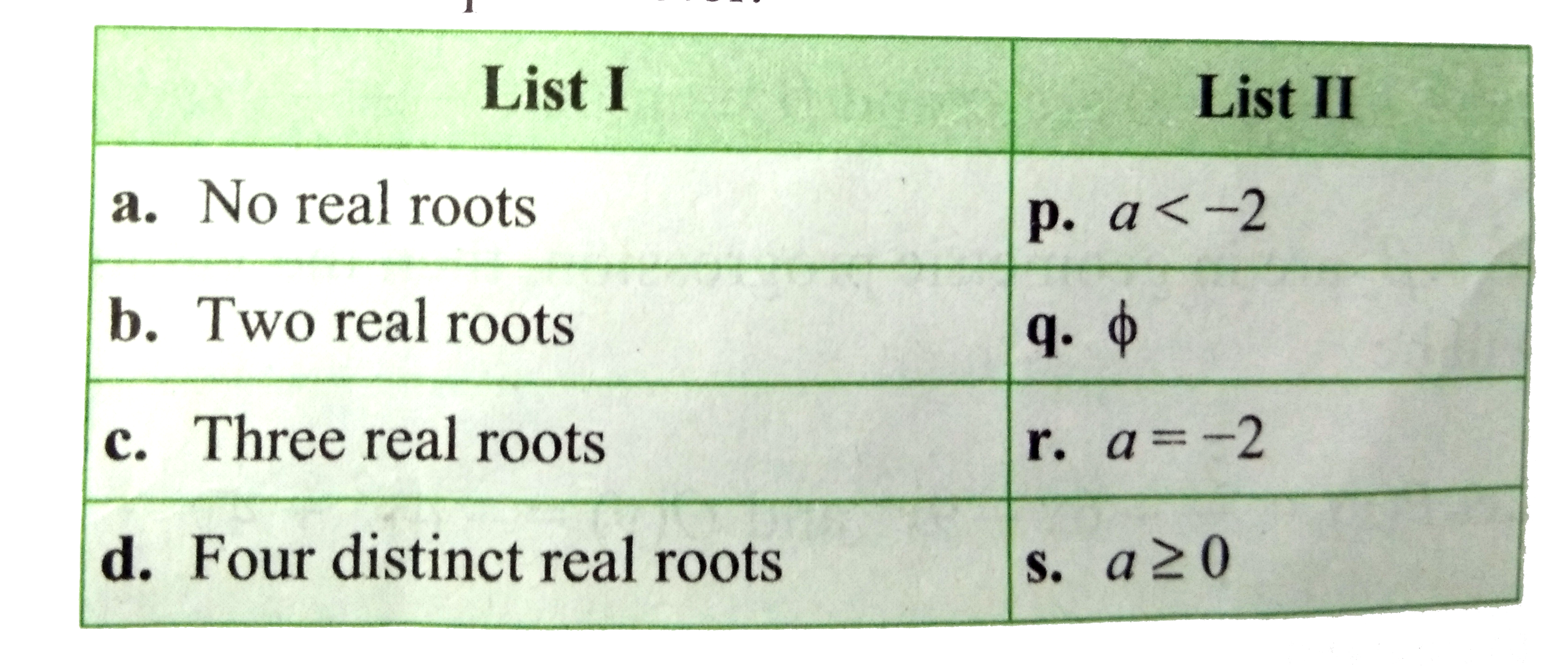If the equation ax2+bx+c=0,a,b,c,∈ R have non -real
roots, then Solution in Bengali
c(a−b+c)>0
c(a+b+c)>0
c(4a−2b+c)>0
none of these
The correct Answer is:1,2,3
Since the roots if ax2+bx+c=0 are nonreal , so f(x)=ax2+bx+c
Will have same sign for every value of x. Hence,
f(0)=c.f(1)=a+b+c,f(−1)=a−b+c
f(−2)=4a−2b+c
⇒c(a+b+c)>0,c(a−b+c)>0,c(4a−2b+c)>0 .
Topper's Solved these Questions
- THEORY OF EQUATIONSBOOK - CENGAGE PUBLICATIONCHAPTER - THEORY OF EQUATIONSEXERCISE - Linked Comprechension Type
37 Videos
- THEORY OF EQUATIONSBOOK - CENGAGE PUBLICATIONCHAPTER - THEORY OF EQUATIONSEXERCISE - MATRIX MATCH TYPE
6 Videos
- THEORY OF EQUATIONSBOOK - CENGAGE PUBLICATIONCHAPTER - THEORY OF EQUATIONSEXERCISE - Single Correct Answer Type : Exercise
89 Videos
- STRAIGHT LINESBOOK - CENGAGE PUBLICATIONCHAPTER - STRAIGHT LINESEXERCISE - ARCHIVES (NUMERICAL VALUE TYPE)
1 Videos
- THREE DIMENSIONAL GEOMETRYBOOK - CENGAGE PUBLICATIONCHAPTER - THREE DIMENSIONAL GEOMETRYEXERCISE - All Questions
291 Videos
Similar Questions
Consider an unknow polynomial which divided by (x−3) and (x−4) leaves remainder 2 and 1, respectively. Let R(x) be the remainder when this polynomial is divided by (x−3)(x−4).
If equations R(x)=x2+ax+1 has two distint real roots, then exhaustive values of a are.
View SolutionMatch the following for the equation x2+a|x|+1=0 where, a is a parameter.

View SolutionThe value of expression x4−8x3+18x2−8x+2 when x=2+√3
View SolutionFor a point P in the plane, let d1(P)andd2(P) be the distances of the point P from the lines x−y=0andx+y=0 respectively. The area of the region R consisting of all points P lying in the first quadrant of the plane and satisfying 2≤d1(P)+d2(P)≤4, is
View SolutionFind the angle between the line whose direction cosines are given by l+m+n=0andl2+m2−n2=0.
View Solutiona,b,c∈R,a≠0 and the quadratic equationax2+bx+c=0 has no real roots, then
View SolutionIf coefficients of the equation ax^(2)+bx+c=0,a!=0 are real and roots of the equation are non-real complex and a+c
View SolutionIf 0
View SolutionIf the roots of equation ax^(2)+bx+c=0;(a,b,c in R and a!=0) are non-real and a+c>b. Then
View SolutionIf the equation ax^(2)+bx+c=0 has non-real roots,prove that 1+(c)/(a)+(b)/(a)>0
View SolutionIf ax^(2)+bx+c=0 and cx^(2)+bx+a=0(a,b,c in R) have a common non-real roots,then which of the following is not true?
View SolutionTheorem : Let a, b, c ∈ R and a ≠0. Then the roots of ax2+bx+c=0 are non-real complex numbers if and only if ax2+bx+c and a have the same sign for all x∈R.
View SolutionIf the equaiton ax2+bx+c=0 where a,b,c ∈ R have non-real roots then-
View SolutionIf ax2+bx+c=0 and cx2+bx+a=0(a,b,c∈R) have a common non - real root, then
View SolutionIf ax2+bx+c=0andcx2+bx+a=0(a,b,c∈R) have a common non-real roots, then which of the following is not true ?
View SolutionIf the equation ax2+bx+c=0,a,b,c,∈ R have non -real
roots, then
View Solution
